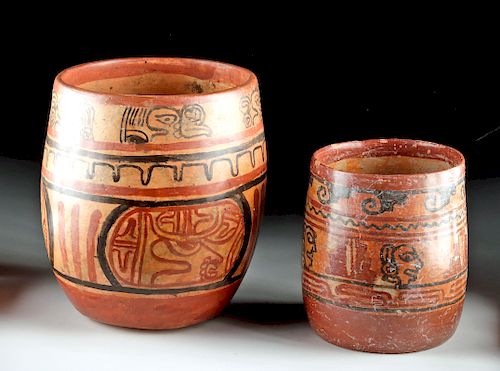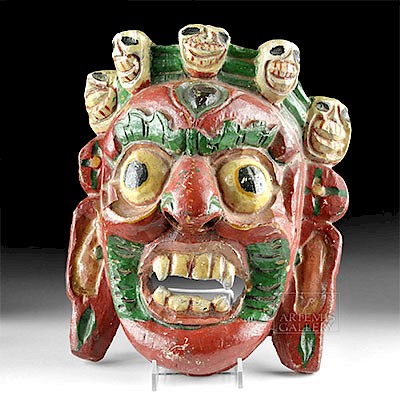Lot of 2 Fine Maya Copador Polychrome Cylinders
Lot 24
About Seller
Artemis Fine Arts
686 S Taylor Ave, Ste 106
Louisville, CO 80027
United States
Selling antiquities, ancient and ethnographic art online since 1993, Artemis Gallery specializes in Classical Antiquities (Egyptian, Greek, Roman, Near Eastern), Asian, Pre-Columbian, African / Tribal / Oceanographic art. Our extensive inventory includes pottery, stone, metal, wood, glass and textil...Read more
Estimate:
$3,500 - $5,000
Absentee vs Live bid
Two ways to bid:
- Leave a max absentee bid and the platform will bid on your behalf up to your maximum bid during the live auction.
- Bid live during the auction and your bids will be submitted real-time to the auctioneer.
Bid Increments
| Price | Bid Increment |
|---|---|
| $0 | $25 |
| $300 | $50 |
| $1,000 | $100 |
| $2,000 | $250 |
| $5,000 | $500 |
| $10,000 | $1,000 |
| $20,000 | $2,500 |
| $50,000 | $5,000 |
| $100,000 | $10,000 |
| $200,000 | $20,000 |
About Auction
By Artemis Fine Arts
Apr 25, 2019
Set Reminder
2019-04-25 10:00:00
2019-04-25 10:00:00
America/New_York
Bidsquare
Bidsquare : Pre-Columbian | Tribal | Ethnographic
https://www.bidsquare.com/auctions/artemis-gallery/pre-columbian-tribal-ethnographic-4035
Featuring ancient and ethnographic art from around the world, including Pre-Columbian, Native American, African / Tribal, Ethnographic, Spanish Colonial, Fossils, Fine Art, much more. Artemis Fine Arts info@artemisgallery.com
Featuring ancient and ethnographic art from around the world, including Pre-Columbian, Native American, African / Tribal, Ethnographic, Spanish Colonial, Fossils, Fine Art, much more. Artemis Fine Arts info@artemisgallery.com
- Lot Description
Pre-Columbian, El Salvador, Maya, Copador, Late Classic Period, ca. 600 to 900 CE. A wonderful set of two hand-built pottery cylinders, both with flat bases and thick rims and a pale-orange base color, the smaller with a lightly-tapering form, and the larger with bulging walls. The smaller vessel is decorated with thick red swaths along the rim and lower body, repeating black-painted registers of undulating waves, zigzagging lines, red-painted spacer lines above and sinuous waves below, and a register of red pyramids and black stylized human heads in the center. The top of the larger vessel has black-painted glyphs in abstract avian and human head forms, with a register of repeating arches above a trio of abstract deer-form glyphs separated by vertical red frets. Size of largest (deer glyphs): 6.5" W x 7.4" H (16.5 cm x 18.8 cm).
Copador pottery was manufactured at Copan and traded widely throughout the southern Maya region. This particular style was created by artisans in the Copan area specifically for export, and was probably made to combine popular elements in Maya decoration to increase their value. By repeating certain styles, the artisans reinforced ceremonial ideas.
According to Peterson and Green's "Precolumbian Flora and Fauna: Continuity of Plant and Animal Themes in Mesoamerican Art", "The nimble speed and bounding grace of deer only partially suggest their fire and stellar symbolism and their recurring role in creation myths. As one of the most valued sources of meat, deer were also featured in ancient fertility rites. .. The deer is a consistent actor in Maya creation myths. Over time the animal played numerous roles in stories about the formation of the cosmos. Most frequently the deer is a metaphor for the sun during his courtship of the moon. The sun dons a deer skin disguise as part of his plot to regain his wife the moon." (Jeanette Favrot Peterson with essays by Judith Strupp Green, "Precolumbian Flora and Fauna: Continuity of Plant and Animal Themes in Mesoamerican Art"; Mingei International Museum, 1990, p. 22)
Provenance: private California, USA Collection; ex-private San Diego County, California, USA collection; ex-private Smith collection
All items legal to buy/sell under U.S. Statute covering cultural patrimony Code 2600, CHAPTER 14, and are guaranteed to be as described or your money back.
A Certificate of Authenticity will accompany all winning bids.
We ship worldwide and handle all shipping in-house for your convenience.
#145710Smaller vessel has one stable hairline fissure along rim and small chips to rim and body. Larger vessel professionally reassembled from multiple pieces with light restoration, resurfacing, and overpainting along break lines. Both vessels have light abrasions and fading to original pigmentation. Nice earthen deposits throughout.Condition
- Shipping Info
-
All shipping is handled in-house for your convenience. Your invoice from Artemis Gallery will include shipping calculation instructions. If in doubt, please inquire BEFORE bidding for estimated shipping costs for individual items.
-
- Buyer's Premium



 EUR
EUR CAD
CAD AUD
AUD GBP
GBP MXN
MXN HKD
HKD CNY
CNY MYR
MYR SEK
SEK SGD
SGD CHF
CHF THB
THB
















